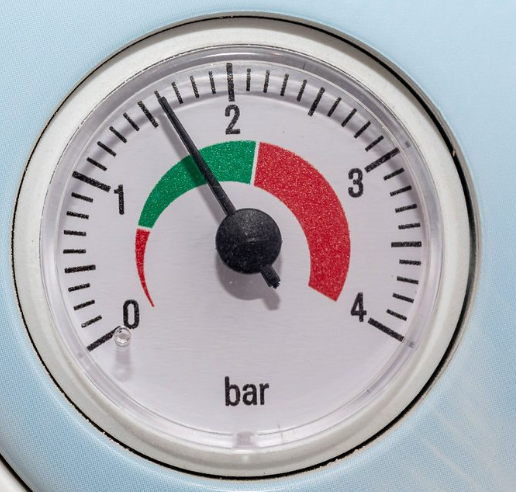Introduction
Boilers play a crucial role in providing heat and hot water for residential and commercial properties. However, achieving the correct pressure for a boiler is essential to ensure optimal performance and efficiency.
In this article, we will dive deep into the world of boiler pressure, covering its importance, factors influencing it, and how to maintain it at the right level. Whether you’re a homeowner or a professional in the heating industry, this guide will equip you with the knowledge and expertise to handle boiler pressure effectively.

What is the Correct Pressure for a Boiler?
The correct pressure for a combi boiler typically ranges between 1.0 to 1.5 bar on the pressure gauge when the system is cold. This level ensures optimal performance and efficiency. If the pressure falls below 1.0 bar, it may indicate a potential issue, and it should be repressurised following the manufacturer’s guidelines to maintain the boiler’s functionality.
Boiler pressure refers to the pressure of the hot water or steam within the system. It is a critical factor as it affects the boiler’s efficiency and safety. Maintaining the correct pressure ensures that your boiler operates optimally, providing reliable heat and hot water without wasting energy or risking damage.
Factors Affecting Boiler Pressure
Several factors influence the pressure of a boiler, and understanding them is vital for maintaining the appropriate pressure levels.
1. Water Volume and Temperature
The volume of water inside the boiler and its temperature can impact the pressure. As the water heats up, it expands, leading to an increase in pressure. Conversely, as it cools down, the pressure decreases. Monitoring and adjusting the water temperature is crucial to maintaining the correct pressure.
2. Boiler Type
Different types of boilers have varying pressure requirements. For instance, a conventional boiler and a combi boiler may operate at different pressure levels. It is essential to consult the manufacturer’s guidelines to determine the ideal pressure range for your specific boiler model.
3. Heating System Size
The size of the heating system also affects boiler pressure. Larger heating systems may require higher pressures to distribute heat efficiently throughout the property.
4. Water Leaks
Any water leak within the boiler or heating system can cause a drop in pressure. Identifying and repairing leaks promptly is vital to maintaining the correct pressure and preventing potential damage.
5. Boiler Age and Condition
Older boilers may be more susceptible to pressure fluctuations due to wear and tear. Regular maintenance and inspections are necessary to ensure older boilers operate safely and at the correct pressure.
How to Check Boiler Pressure
Keeping an eye on your boiler’s pressure is a simple yet crucial task that should be done regularly. Here’s how you can check the pressure:
- Locate the Pressure Gauge: The pressure gauge is usually located on the front panel of the boiler.
- Check the Reading: When the boiler is cold, the gauge should show the recommended pressure range (around 1 to 1.5 bar). If the pressure is too high or too low, adjustments may be necessary.
- Adjusting the Pressure: If the pressure is too low, you can increase it by adding water to the system using the filling loop. If the pressure is too high, you may need to bleed some water from the radiators to reduce it.
- Repeat the Process: After making adjustments, check the pressure again to ensure it falls within the correct range.
Common FAQs About Boiler Pressure
Q: What should I do if my boiler pressure is too high?
A: If your boiler pressure is too high, you can bleed some water from the radiators to reduce it. If you’re unsure how to do this, it’s best to contact a qualified heating engineer to avoid any mishaps.
Q: Can low boiler pressure cause heating issues?
A: Yes, low boiler pressure can lead to heating issues as it may prevent the boiler from providing adequate heat to the property. Checking and maintaining the correct pressure can help resolve such issues.
Q: How often should I check my boiler pressure?
A: It’s recommended to check your boiler pressure at least once a month, especially during colder months when the heating system is in frequent use.
Q: Why does my boiler pressure keep dropping?
A: If your boiler pressure keeps dropping, it could indicate a leak somewhere in the system. Inspect the pipes, radiators, and boiler for any signs of water leakage.
Q: Is high boiler pressure dangerous?
A: Yes, high boiler pressure can be dangerous as it may lead to the release of excess pressure through the pressure relief valve, causing potential hazards. Keeping the pressure within the recommended range is crucial for safety.
Q: Can boiler pressure affect hot water supply?
A: Yes, incorrect boiler pressure can affect the hot water supply, leading to fluctuations in water temperature or inadequate hot water.
Conclusion
Understanding and maintaining the correct pressure for a boiler is essential for its efficient and safe operation. Factors such as water volume, boiler type, and heating system size all play a role in determining the ideal pressure range. Regularly checking and adjusting the pressure as needed will ensure your boiler runs optimally, providing reliable heat and hot water throughout the year.
Remember, if you’re ever uncertain about handling boiler pressure or encounter any issues, it’s best to seek assistance from a qualified heating engineer to ensure the safety and longevity of your boiler system.
